Political conferences 2016: At-a-glancepublished at 16:23 BST 17 October 2016
The best bits from the 2016 party conference season.
Read MoreTheresa May to discuss Brexit at EU summit
Voters going to polls in Witney and Batley and Spen by-elections
Thousands of men convicted of now-abolished sexual offences to receive pardons
Scottish parliamentary boundary change plans unveiled
MPs back stripping Sir Philip Green of knighthood
Claire Heald and Alex Hunt
The best bits from the 2016 party conference season.
Read MoreInvestigatory Powers Bill
 House of Lords
House of Lords
Parliament
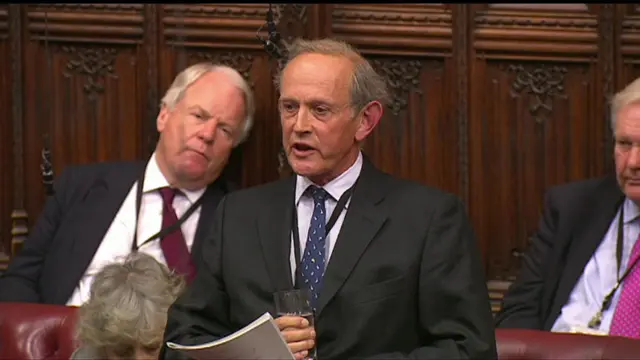
Crossbench peer and former Army officer Viscount Brookeborough recalls 40 years of the Troubles in Northern Ireland.
He says the security forces gathered and retained intelligence - and much of this information also "became very useful" after it had been used for its original purpose.
He argues that lives have been protected by what previously seemed to be "snippets" of information and opposed "willfully restricting our access to what amounts to very important intelligence indeed".
Child sexual abuse inquiry urgent question
 House of Commons
House of Commons
Parliament
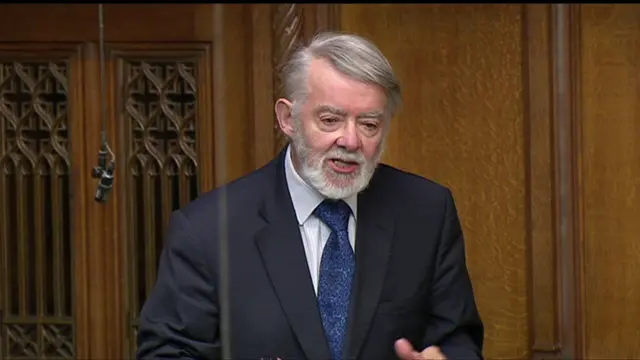
Veteran Labour backbencher Paul Flynn mentions the Saville Report into Bloody Sunday. It took, he says 12 years and £190m to report on "a single event that took place over two hours".
He says that this inquiry has been given the "mission impossible" of reporting on "100,000s of incidents that took place over many decades" and asks if it's time to admit that the inquiry was a "political escape hole". He says that the inquiry is of "vital importance" but that it must be reshaped so that it can report "within our lifetimes".
Amber Rudd says the inquiry is "essential, important and valued", not political. She adds that new chair Alexis Jay hopes to conclude the inquiry by the end of 2020.
Maria Miller, former minister and current Chair of the Women and Equalities Select Committee, was speaking on Daily Politics
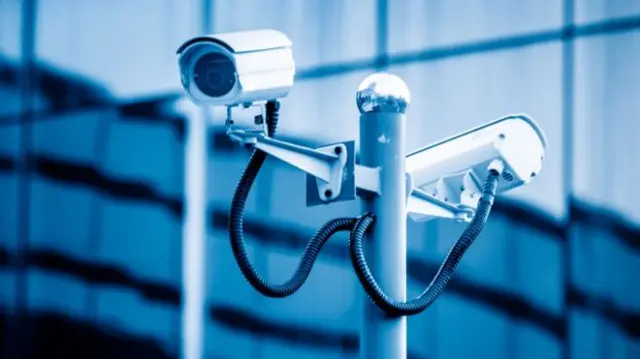 Image source, Thinkstock
Image source, ThinkstockLib Dem home affairs spokesperson Alistair Carmichael has responded to a tribunal ruling that British intelligence agencies illegally collected the data of UK citizens.
Mr Carmichael said: “Allowing the state to collect endless amounts of personal data is not just a gross invasion of a privacy, it is a waste of precious resources.
“Mass spying on the British people should be replaced with targeted surveillance of specific individuals suspected of wrongdoing.”
The Investigatory Powers Tribunal ruled , externalthat GCHQ, MI5 and MI6 had contravened Article 8 of the European Convention on Human Rights while collecting personal data in bulk.
A new policy on data collection came into force in February 2015, which the tribunal found to be lawful
The home office said it was pleased the tribunal had "confirmed the current lawfulness of the existing bulk communications data and bulk personal dataset regimes."
Read more: UK spy agencies 'broke privacy rules' says tribunal
Investigatory Powers Bill
 House of Lords
House of Lords
Parliament
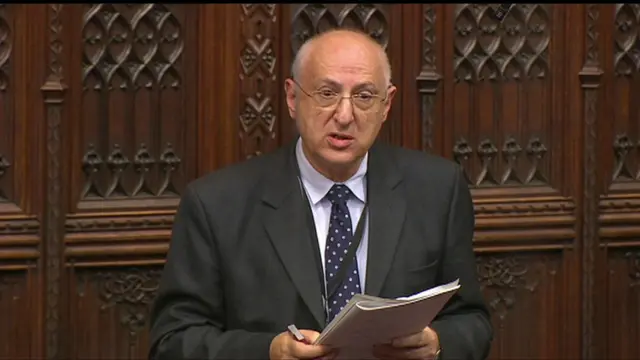
Lord Carlile reported to Parliament on counter-terrorism law from 2001 to 2011
Liberal Democrat peer Lord Paddick introduces an amendment to remove an entire clause from the bill, which covers "filtering arrangements for obtaining data".
Lord Paddick argues that this clause gives too much power to the secretary of state, asking: "How many in the House believe that government should be given unfettered access to personal information?"
However, another Lib Dem peer, the former Independent Reviewer of Terrorism Legislation Lord Carlile of Berriew, indicates he cannot support his party's amendment.
He argues it would "reduce the capacity of the authorities legitimately to interdict what could be extremely serious crime".
Child sexual abuse inquiry urgent question
 House of Commons
House of Commons
Parliament
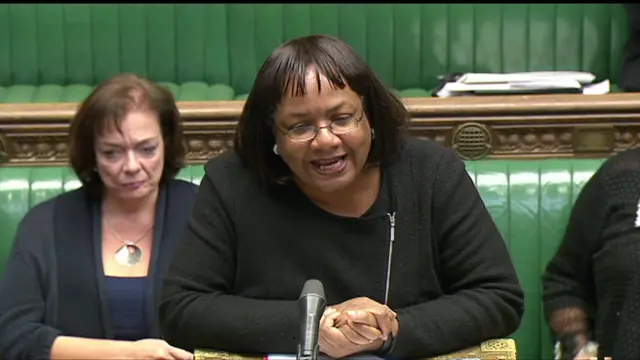
The shadow home secretary Diane Abbott says that "no inquiry in modern times has been mired in such chaos" and that it's a "terrible situation" for survivors who have "put so much hope" into the inquiry.
She asks the home secretary why she didn't ask Dame Lowell Goddard why she resigned. Amber Rudd has twice quoted from the ex-chair's resignation letter, but never met Dame Lowell while she was considering her resignation.
Ms Abbott also asks if the inquiry's independence can be guaranteed and for guarantees that it will not be scaled back.
In response, Amber Rudd is full of praise for Alexis Jay, the new chair of the inquiry, who is best known for her inquiry into the Rotherham sexual abuse scandal.
She says that terms of reference are "very clear" on independence, and continuing to be independent is essential. There is, she says, "no question of the Home Office scaling back an inquiry, this is for the chair".
Investigatory Powers Bill
 House of Lords
House of Lords
Parliament
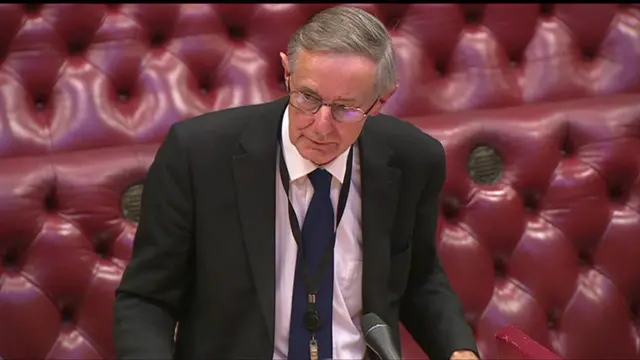
Labour spokesman Lord Rosser says his party welcomes the addition of some crimes, such as stalking, to those which could justify the obtaining of communications data.
However, the opposition still has "concerns around the definition of relevant crime" which, he says, is "too broad".
Labour is proposing setting the threshold higher, to apply to crimes which would attract a prison sentence of 12 months or more, an increase from six months in the original text of the bill.
The Labour amendment attracts Liberal Democrat support and the government indicates it is willing to accept it.
 House of Commons
House of Commons
Parliament
Home Secretary Amber Rudd is answering an urgent question from Labour's Lisa Nandy on the child sexual abuse inquiry.
The inquiry is investigating if state and non-state institutions in England and Wales failed to protect children from abuse.
The inquiry has been through three chairwomen since it was announced by the then-Home Secretary Theresa May in 2014. The most recent, Dame Lowell Goddard, a high court judge from New Zealand, resigned in August.
Dame Lowell Goddard has since been accused of making racist comments, which she strongly denies.
Amber Rudd says she wants to "spell out the facts" on the resignation. She says inquiry members came to her to "raise concerns" about the chair. Less than a week later Dame Lowell resigned. She says she did not speak at any point to Dame Lowell Goddard and only knows about her reasons for standing down from her resignation letter.
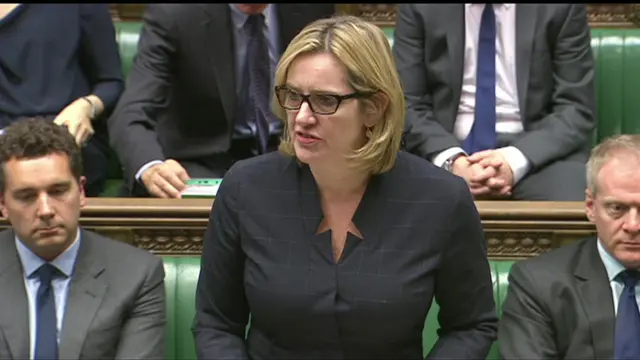
Investigatory Powers Bill
 House of Lords
House of Lords
Parliament
Baroness Jones says she is "not convinced" by the minister's attempts at reassurance.
However, she withdraws her amendment. Labour had indicated that it did not support it.
Next - a Liberal Democrat amendment limiting the disclosure of communications data and requiring its destruction once it has been used for the purpose for which it has been gathered.
The government's Earl Howe again claims this is an unnecessary amendment as there must be "a lawful purpose" for gathering data and it must be destroyed once used for that purpose. Lib Dem Baroness Hamwee says she accepts the government's assurances
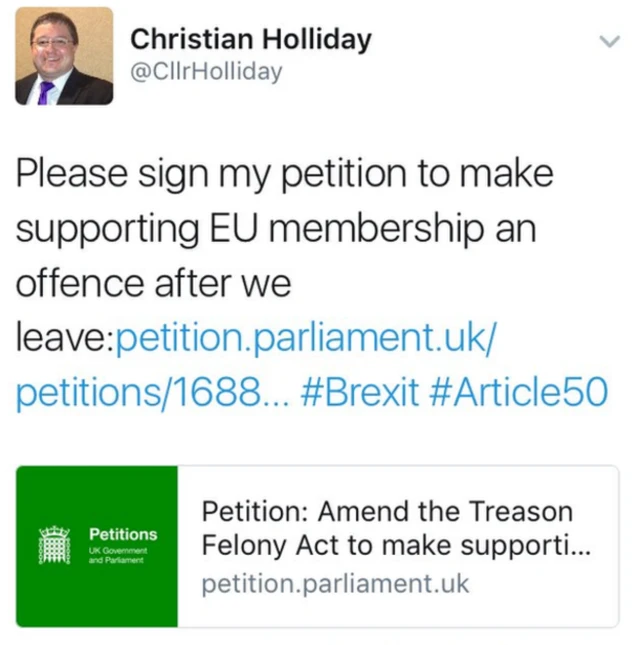 Image source, Twitter
Image source, TwitterA Conservative councillor has been suspended after he published a petition calling for support of British membership of the EU to be made a treasonable offence.
Christian Holliday, who represents Burpham ward, tweeted his petition earlier today.
Allow X content?
This article contains content provided by X. We ask for your permission before anything is loaded, as they may be using cookies and other technologies. You may want to read X’s cookie policy, external and privacy policy, external before accepting. To view this content choose ‘accept and continue’.
In a statement, external, Guildford Conservative Association said: "Guildford Conservative Association is aware of the petition.
"This does not represent the views of the local Conservative Association and we will consider the matter in due course."
Work and Pensions questions
 House of Commons
House of Commons
Parliament
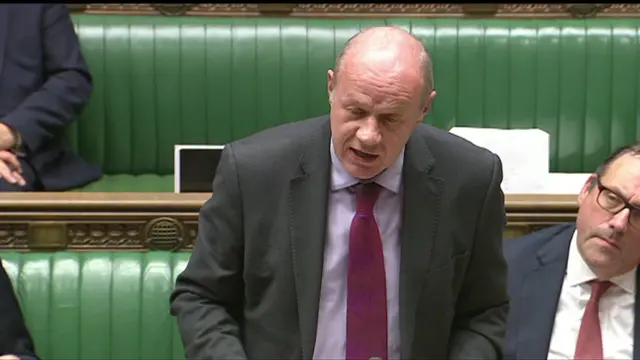
Labour's Alex Cunningham says that post-Brexit, Britain is seeing "low growth" and "rock bottom interest rates", which put pensions at risk. What is the government going to do to "shore up the pensions of people who've earned their retirement?" he asks.
Work and Pensions Secretary Damian Green says that the best way to safeguard the pension system is to "make sure that our underlying economy is strong" and that it continues to create jobs which is "what [the government] will continue to do".
Investigatory Powers Bill
 House of Lords
House of Lords
Parliament
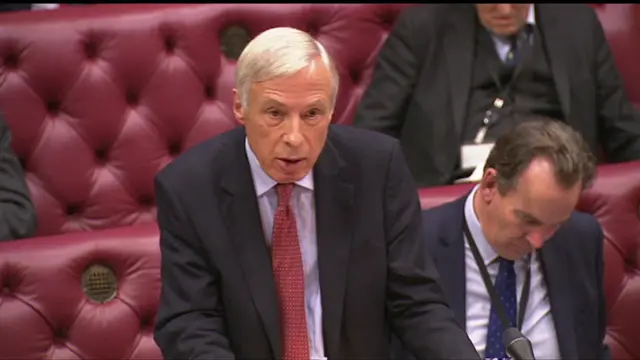
For the government, deputy leader of the Lords Earl Howe says it is "difficult to see what benefit" an additional test of grounds for suspicion would achieve.
When authorising surveillance, "a sufficiently compelling case will always be required", he insists.
He argues that a higher authorisation threshold for "serious crime" could prevent online fraud being investigated, for example.
 House of Lords
House of Lords
Parliament
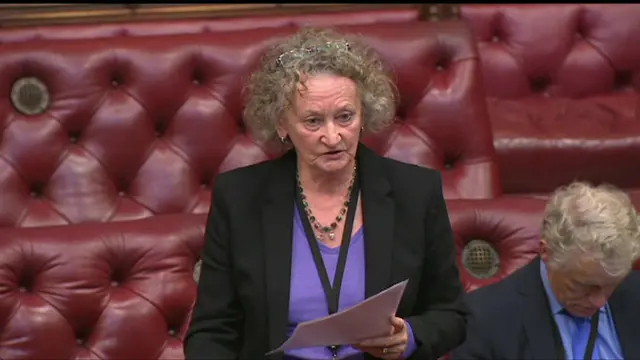
The House of Lords now turns to detailed, report stage scrutiny of the Investigatory Powers Bill. This is day two of report stage, which allows peers to consider the bill in detail and propose amendments, which may be voted on.
Debate begins on a group of amendments concerning the disclosure of communications data, which are quickly approved.
After that, Green Party peer Baroness Jones of Moulsecoomb puts forward an amendment concerning "a requirement to demonstrate suspicion of serious crime", as she puts it.
"One of the greatest problems with this bill is the lack of reasonable suspicion" before surveillance is authorised, she argues.
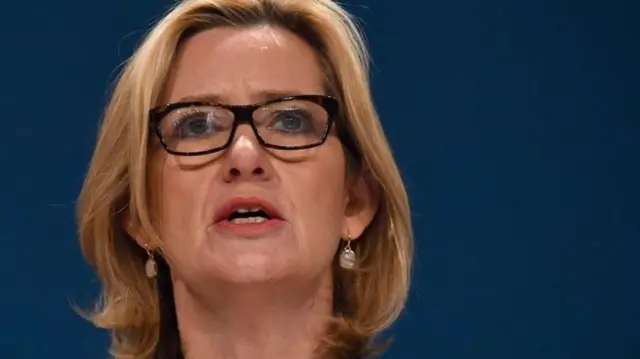 Image source, AFP
Image source, AFPHome Secretary Amber Rudd is to update MPs on the latest controversy to hit the child sexual abuse inquiry.
Labour MP Lisa Nandy has tabled an urgent question in the Commons, asking about the inquiry's "remit, organisation, budget and staffing".
The Independent Inquiry into Child Sexual Abuse was set up by then-Home Secretary Theresa May in 2014.
Three of its chairwomen have quit since it was formed, with the latest, Dame Lowell Goddard, resigning in August.
Allow X content?
This article contains content provided by X. We ask for your permission before anything is loaded, as they may be using cookies and other technologies. You may want to read X’s cookie policy, external and privacy policy, external before accepting. To view this content choose ‘accept and continue’.
Lords questions
 House of Lords
House of Lords
Parliament
Two peers give their views on the under-occupancy charge, labelled the "spare room subsidy" by ministers and the "bedroom tax" by opponents.
Conservative Lord Naseby claims that most claims against the penalty "don't have much validity" and urges people to "think about downsizing appropriately or paying the appropriate rent".
Labour peer and former cabinet minister Lord Blunkett notes that the policy does not apply to the retired, who often have more space.
He suggests that it should be applied to older people rather than young people with families.
Lords questions
 House of Lords
House of Lords
Parliament
The final question comes from Labour peer Baroness Quinn, who asks what recent meetings have taken place between ministers and citizens affected by the under-occupancy charge.
The charge applies to council tenants who have been deemed to have a "spare" room and critics have labelled it the "bedroom tax".
Work and Pensions Minister Lord Freud says there has been an increase in discretional housing payments and help "for those who are vulnerable".
Baroness Quinn says the "bedroom tax" still affects many people and calls for a meeting with affected citizens and ministers - but Lord Freud says that is "not appropriate" at this stage, which causes some disquiet in the House.
Work and Pensions questions
 House of Commons
House of Commons
Parliament
Labour's Carolyn Harris asks about the women born in the 1950s who have been affected by the raising of the state pension age from 60 to 66. Women have been campaigning for compensation for the changes under the tag "Women Against State Pension Inequality" (WASPI).
Minister Richard Harrington says that the government has committed £1bn for the women and that 81% will see their state pension age increase by no more than 12 months, compared to the previous schedule.
Carolyn Harris angrily demands that the minister acknowledge the "grave injustice" done to the women and demands a "transitional payment".
Richard Harrington says that, as the House has been told "many times before", there is £1bn for transitional arrangements, and that "no further moves will be made to assist these women".
They will all, he says, benefit from the government's changes to the pension system.
The government's top lawyer, Attorney General Jeremy Wright, has told the High Court that invoking the process of leaving the EU would be "irrevocable."
Mr Wright told the court that there would be no going back after Article 50 was triggered, appearing to settle some confusion over whether or not an act of parliament in the UK could stop or even reverse the Brexit process.
Prime Minister Theresa May has repeatedly said that "Brexit means Brexit," and recently criticised MPs calling for a parliamentary vote on invoking Article 50, saying they were "not standing up for democracy, [but] trying to subvert it."
Read more: MPs' consent 'not needed for Article 50 to trigger Brexit'